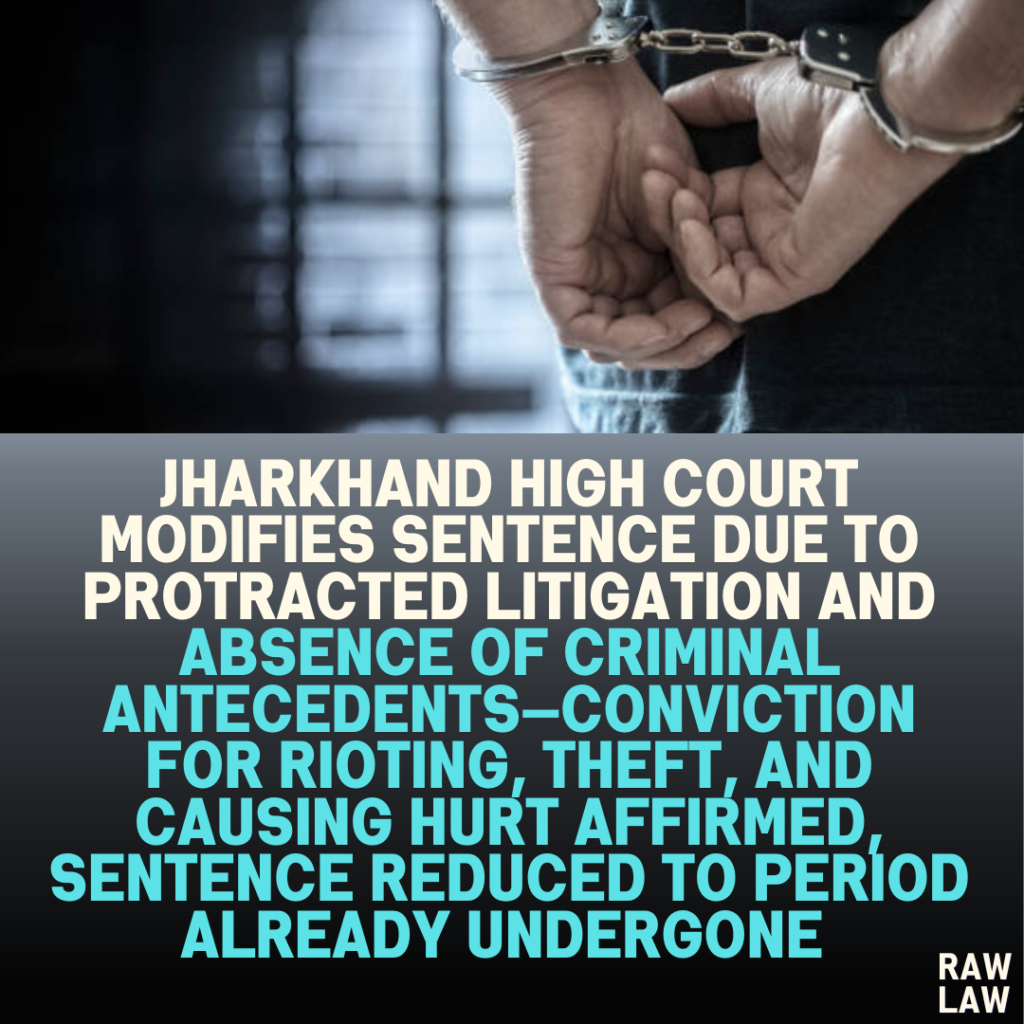Court’s Decision:
The Jharkhand High Court dismissed the appeals and modified the sentence of the appellants to the period already undergone, affirming the judgment of conviction by the Trial Court under Sections 148, 380, 324/149, and 286 of the IPC. The Court considered the nature of the offence, the protracted nature of litigation, and the absence of criminal antecedents as factors for modifying the sentence.
Facts:
The appellants were convicted under Sections 148, 380, 324/149, and 286 IPC and were sentenced to undergo rigorous imprisonment for seven years and a fine of Rs. 2,000/- each under Section 380 IPC. In default, they were to further undergo three months of imprisonment. Additionally, they were sentenced to three years under Section 324 IPC, six months under Section 286 IPC, and three years under Section 148 IPC.
The case arose as a continuation of an earlier matter involving a death, where the informant’s party assisted the police in securing the arrest of the accused in that case. This assistance led to a subsequent altercation between the appellants and the informant’s party, which resulted in the current charges. There was no evidence of grievous or critical injuries in the alleged incident.
Issues:
- Whether the conviction under Sections 148, 380, 324/149, and 286 IPC was justified based on the evidence.
- Whether the sentence awarded by the Trial Court was appropriate considering the circumstances and nature of the offence.
Petitioner’s Arguments:
- The learned counsel for the appellants confined the arguments to the point of sentence.
- It was submitted that the present case was an offshoot of a previous case where the informant’s party had aided in the arrest of the accused.
- The counsel argued that the appellants were farmers with no prior criminal records, and the incident did not result in grievous injury.
Respondent’s Arguments:
- The State defended the judgment of conviction and sentence, emphasizing the sufficiency of evidence for conviction and the gravity of the offences involved.
Analysis of the Law:
The High Court evaluated the application of Sections 148 (rioting, armed with a deadly weapon), 380 (theft in dwelling house), 324/149 (voluntarily causing hurt with common intention), and 286 (negligent conduct with respect to explosive substances) IPC. The Court noted that while the evidence supported the conviction, the nature of the injuries and the protracted litigation warranted a modification in the sentence.
Precedent Analysis:
The judgment does not explicitly refer to prior cases, but the principles applied align with jurisprudence on reducing sentences where there is a long delay in litigation and no prior criminal record.
Court’s Reasoning:
The High Court took into account the appellants’ age, the absence of criminal antecedents, and the nature of the injuries. It highlighted that the incident took place in 1996, and the judgment was delivered in 2004. Given the protracted litigation and the minor nature of the injuries sustained, the Court found that the ends of justice would be met by reducing the sentence to the period already undergone.
Conclusion:
The appeals were dismissed, with the modification in the sentence. The conviction was upheld, but the sentence was reduced to the period already undergone by the appellants.
Implications:
The judgment underscores the importance of considering mitigating factors like the delay in litigation, the nature of the offence, and the absence of criminal antecedents when determining appropriate sentences. It also reflects the Court’s approach in balancing justice with compassion, especially in long-standing cases.
